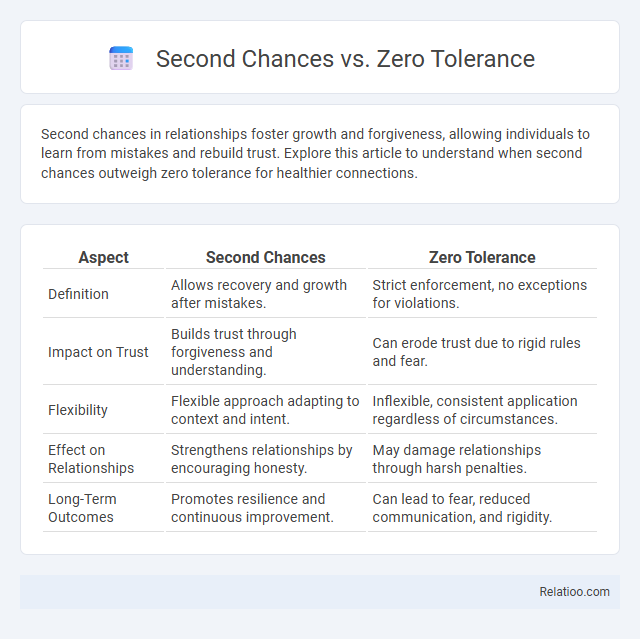Second chances in relationships foster growth and forgiveness, allowing individuals to learn from mistakes and rebuild trust. Explore this article to understand when second chances outweigh zero tolerance for healthier connections.
Table of Comparison
| Aspect | Second Chances | Zero Tolerance |
|---|---|---|
| Definition | Allows recovery and growth after mistakes. | Strict enforcement, no exceptions for violations. |
| Impact on Trust | Builds trust through forgiveness and understanding. | Can erode trust due to rigid rules and fear. |
| Flexibility | Flexible approach adapting to context and intent. | Inflexible, consistent application regardless of circumstances. |
| Effect on Relationships | Strengthens relationships by encouraging honesty. | May damage relationships through harsh penalties. |
| Long-Term Outcomes | Promotes resilience and continuous improvement. | Can lead to fear, reduced communication, and rigidity. |
Understanding Second Chances: Definition and Principles
Understanding second chances involves recognizing opportunities for individuals to learn from mistakes and improve behavior without facing permanent penalties, based on principles of forgiveness, growth, and fairness. Unlike zero tolerance policies that impose strict, uncompromising consequences regardless of context, second chances emphasize rehabilitation and the belief that people can change. Your approach to second chances fosters a supportive environment where mistakes serve as learning moments rather than final judgments.
The Philosophy Behind Zero Tolerance Policies
Zero tolerance policies enforce strict consequences for specific offenses without exceptions, aiming to maintain order and deter misconduct through uniform application of rules. This philosophy prioritizes consistency and accountability, often at the expense of considering individual circumstances or opportunities for rehabilitation. Your understanding of these policies highlights the contrast with second chances and redemption approaches that emphasize growth and forgiveness.
Historical Context: Evolution of Disciplinary Approaches
The historical context of disciplinary approaches reveals a shift from rigid zero tolerance policies, characterized by strict, unyielding punishments, to more nuanced frameworks emphasizing second chances and redemption. Early punitive systems often prioritized immediate consequences over rehabilitation, whereas modern strategies increasingly integrate restorative justice principles to address underlying causes of behavior. Understanding this evolution helps you appreciate how contemporary disciplinary practices balance accountability and the potential for personal growth.
Benefits of Embracing Second Chances
Embracing second chances fosters personal growth, resilience, and social reintegration by allowing individuals to learn from mistakes while avoiding the punitive rigidity of zero tolerance policies. Redemption through second chances encourages positive behavioral change and reduces recidivism, contributing to healthier communities and stronger support networks. This approach promotes empathy and restorative justice, enhancing overall societal harmony and individual potential.
Drawbacks and Criticism of Zero Tolerance
Zero Tolerance policies often face criticism for their rigidity and inability to consider individual circumstances, leading to disproportionate punishments that may not fit the severity of offenses. These policies can contribute to increased recidivism rates by failing to provide opportunities for rehabilitation or learning from mistakes. In contrast, Second Chances and Redemption emphasize restorative justice and personal growth, addressing the limitations of Zero Tolerance through more flexible and compassionate approaches.
Impact on Individuals: Rehabilitation vs Punishment
Second Chances emphasize rehabilitation by offering individuals opportunities to learn and grow from mistakes, fostering personal development and social reintegration. Zero Tolerance policies prioritize strict punishment, often leading to negative outcomes such as stigmatization and limited future opportunities. Redemption balances accountability with empathy, allowing Your potential for change to be recognized while promoting restorative justice and long-term well-being.
Societal Outcomes: Recidivism and Community Trust
Second Chances promote lower recidivism rates by offering rehabilitation and support, enhancing Your reintegration into society and fostering community trust. Zero Tolerance policies often lead to increased incarceration without addressing underlying issues, resulting in higher recidivism and diminished public confidence. Redemption approaches balance accountability with forgiveness, improving societal outcomes by restoring trust and decreasing repeat offenses.
Case Studies: Successes and Failures of Each Approach
Case studies reveal that second chances often lead to successful rehabilitation by addressing underlying issues like addiction or poverty, exemplified by reduced recidivism rates in programs supporting ex-offenders. Zero tolerance policies, while aiming for strict discipline, frequently result in high failure rates due to lack of flexibility and disproportionate punishments, as seen in schools with escalating dropout rates. Your understanding of redemption emerges from examples where sincere efforts to make amends have transformed lives, though some cases highlight challenges in societal acceptance and sustained change.
Striking the Balance: Combining Accountability and Compassion
Striking the balance between second chances and zero tolerance policies requires integrating accountability measures with compassionate support systems to foster personal growth and societal safety. Implementing restorative justice frameworks encourages responsibility while offering opportunities for redemption, reducing recidivism and promoting rehabilitation. Effective strategies prioritize tailored interventions that address underlying issues, ensuring fairness without compromising community well-being.
Future Perspectives: Rethinking Justice and Policy Making
Future perspectives on justice emphasize balancing second chances, zero tolerance, and redemption to create more effective policies. Your community benefits when reformative approaches integrate restorative practices, reducing recidivism and promoting social reintegration. Innovative policy-making focuses on evidence-based strategies that prioritize rehabilitation while safeguarding public safety.

Infographic: Second Chances vs Zero Tolerance
 relatioo.com
relatioo.com